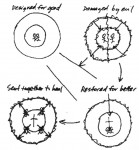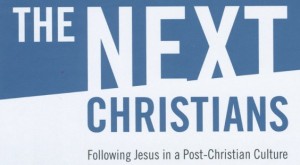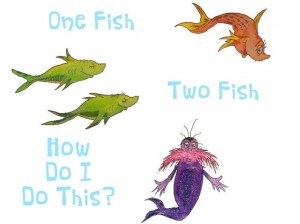
Weird Desires*
Sycamore Creek Church
Tom Arthur
September 1/2, 2013
1 John 2:16-17
Veruca Salt. The name is synonymous with the phrase: “I want it now.” She’s the character in Willy Wonka and the Chocolate Factory who is a rich spoiled girl whose daddy gives her everything she wants. It doesn’t turn out well for her in the end.
This week we wrap up a series called Weird. There’s a weird way to live life and a normal way to live life. We’re choosing weird, because normal isn’t working.
Jesus talks about the weird and normal when he says:
Enter through the narrow gate; for the gate is wide and the road is easy that leads to destruction, and there are many who take it. For the gate is narrow and the road is hard that leads to life, and there are few who find it.
Matthew 7:13-14
So far we’ve explored what it’s like to be normal and weird when it comes to sex and the way we spend our time. Today we look at desires: weird desires.
Here’s the problem we all wrestle with: It’s normal to give into your desires. I wrestle with this myself. Too often I give my body exactly what it wants. I let that angry word fly. I give my eyes exactly what they want. This past week, I had a couple of not so pleasant days. I went home and drowned them in a bowl of ice cream. I’m not much different than Veruca Salt. I want it now.
If you’re a little more normal when it comes to your desires than you’d like to be, you’re not alone. Moses gave in to his anger and killed the Egyptian overseer. David gave in to his lust and slept with Bathsheba and eventually had her husband killed to cover up the resulting pregnancy. People in the Bible are always getting themselves into trouble by giving their desires what they want.
John, one of Jesus’ most beloved followers says this about normal desires:
For the world offers only the lust for physical pleasure, the lust for everything we see, and pride in our possessions. These are not from the Father. They are from this evil world. And this world is fading away, along with everything it craves. But if you do the will of God, you will live forever.
1 John 2:16-17 NLT
Here’s a truth that has been a foundation of this series:
If you want what normal people have, do what normal people do
If you want what few people have, do what few people do.
I want to look at what normal people do with their desires and what weird people do.
Normal People Give in to Their Desires
Normal people give in to their desires. They give their desires exactly what they want. They do this in two ways. First, normal people give their desires what they want now, not later. Normal people are addicted to instant gratification.
Jesus tells the story of a young son who wants what he wants now, not later; so, like Veruca Salt, he goes to this father to get it:
The younger son told his father, ‘I want my share of your estate now, instead of waiting until you die.’ So his father agreed to divide his wealth between his sons.
Luke 15:12
The younger brother gets what he wants, goes out and squanders it, and eventually finds himself eating humble pie. He goes back to his dad begging to have his basic necessities met.
Normal people want what they want now, not later. They want to “snuggle” now with their significant other and not wait for marriage. They’re hungry so they give themselves ice cream now, not for dessert. They’re angry at their boss so they send a nasty email now, rather than wait for an appropriate time to role renegotiate expectations later. Normal people want what they want now, not later.
Second, normal people trade the ultimate for the immediate. There’s a great story in the Bible about two twin brothers, Esau and Jacob. Esau is the oldest, by a couple of seconds, so he gets a lot of privileges that Jacob doesn’t get. One of those privileges is a birthright, a double portion of inheritance. But Esau has a problem with desire control. Here’s the story:
Once when Jacob was cooking a stew, Esau came in from the field, and he was famished. Esau said to Jacob, “Let me eat some of that red stuff, for I am famished!”…Jacob said, “First sell me your birthright.” Esau said, “I am about to die; of what use is a birthright to me?” Jacob said, “Swear to me first.”So he swore to him, and sold his birthright to Jacob. Then Jacob gave Esau bread and lentil stew, and he ate and drank, and rose and went his way. Thus Esau despised his birthright.
Genesis 25:29-34 NRSV
Who would be so foolish and stupid to trade their birthright for a bowl of soup? But normal people do it every day, one bowl of stew at a time. We buy one more thing and put it on the credit card. $2. $3. $4. Pretty soon we’re $10,000 in debt on our credit card. One bowl of soup at a time. We start with a sensual video online. Then a soft-porn. Then pretty soon we’re into hard-core porn. One bowl of soup at a time. You’re dating a guy who tells you that if you love him, you’ll let him. One bowl of soup at a time. You stay at work a little longer to make a little more money and miss your kids growing up, one bowl of soup at a time. You trade relationships for accomplishments, one bowl of soup at a time. What’s your bowl of soup? Cigarettes? Drugs? Control? Food? Lust? Popularity?
Normal isn’t working.
Weird People Discipline their Desires
So we’ve looked at what normal people do, but what do weird people do? First, weird people know that later is often better than now. The book of wisdom in the Bible called Proverbs says:
It is better to be patient than powerful; it is better to have self-control than to conquer a city.
Proverbs 16:32 NLT
Consider money. Here’s a basic financial principle that weird people know: buy assets now and buy liabilities later. An asset is something that goes up in value or produces income, like a rental property. I was talking to a guy the other day who has built a small business around property management. He said that they own about a dozen homes that they rent out. The rental income is paying the mortgage on those homes. They’re not getting a lot of money right now, so they have to live in a pretty simple house themselves. But once those mortgages are paid off, later, guess what happens. All that rental income is icing on the cake! They’re not living very high on the hog right now, but later down the road, things will start hopping. That’s a weird person.
On the other hand, a liability is something that goes down in value. Almost everything you brought with you today is a liability: your phone, your car, your clothes, your shoes. Even your hairstyle is a liability. The moment you walk out of the salon it begins growing again and fading to gray again. Most of us spend most of our money on liabilities. Weird people spend less on liabilities because they know that a liability may bring pleasure now but not later.
Consider sex, perhaps one of the strongest desires there is. You can get it on now. You can twerk all you want on the dance floor (or watch others twerking), or you can save your sexual purity to build intimacy with someone that will last a lifetime. Normal people choose sex now. Weird people discipline their sexual desire and know that later is better than now.
Second, weird people seek God until his desires become their desires. The Psalms are the prayer book of the Bible. In Psalm 37 we read:
Take delight in the LORD, and he will give you the desires of your heart.
Psalm 37:4 NRSV
The phrase “take delight” is really a little too soft. It should be “take exquisite delight” in the LORD. Then what will happen? If you take exquisite delight in God, then pretty soon, you’ll want the same things that God wants; your desires will be aligned with God’s desires. When that happens, you’re now wanting the same exact same thing that God wants. And what is God likely to give you if you want the same thing that God wants for you? BINGO! When your desires align with God’s desires for you, you’re likely to get what both of you want.
Paul, one of the first missionaries of the church, said:
Live by the Spirit, I say, and do not gratify the desires of the flesh. For what the flesh desires is opposed to the Spirit, and what the Spirit desires is opposed to the flesh; for these are opposed to each other, to prevent you from doing what you want.
Galatians 5:16-17
You’ve got this fleshy side of yourself, and it is usually at war with and opposed to what the Spirit wants. But this needn’t be so forever. You can discipline your body so that it begins to want what God wants. Let me give you an example from my own life. I haven’t arrived yet, but by God’s grace I’m making progress.
When I was in elementary school I remember looking at my first porn magazine in my friend’s house. By high school I was looking at porn almost every day. I was in essence cultivating the desire of lust in my body. I was giving it what it wanted. When you cultivate lust in the privacy of your own home, it’s hard to not lust when you’re out in public and beautiful women are walking around. Now, let me make a distinction here: noticing a beautiful woman is not lusting. It’s what you do with the notice. Where do you take the notice in your mind? That’s where lust comes in. So I spent a lot of time in my younger years cultivating lust at home by the porn I looked at and cultivating lust in public by the way I noticed attractive women.
Slowly over time that began to change. Here’s how it changed. I began cultivating in the privacy of my own home the spiritual practice of spending time with God: prayer, Bible study, meditation, and so on. I also began to cultivate in public the spiritual practice of spending time in Christian community: small groups, accountability, worship, and the like. Slowly but surely the time I spent cultivating lust at home diminished until eventually I was no longer looking at porn at home. This changed how I looked at women in public.
I first noticed a big change one day when I was at a birthday party in seminary. I don’t know what picture you have in your mind of people studying to be pastors, but whatever picture you have is probably wrong. This birthday party I was at was in a bar in Downtown Durham. I haven’t been to enough bars in college towns to know until that night that there is such a thing as a “beer girl.” A beer distributor showed up with free beer samples handed out by a young woman who looked like she had stepped out of a beer commercial. Of course, what she didn’t know was that every guy she was handing beer out to in that place was a guy training to be a pastor! She was dressed to catch the eye of every guy in that place. I don’t know what my friends made of that experience, but something happened to me that had never happened before. I looked at her and my first thought was, “She must be really uncomfortable in those shoes.” Somehow instead of treating her like an object for my desires to lust after, I was treating her like the human being made in God’s image that she was. That was the first time I’d had that experience of noticing the person rather than the object, but it has begun to happen more and more the more I spend time with God.
God can change instantaneously, but that’s the exception, not the rule. The general experience of Christians is that the desires are disciplined slowly over time. And the longer you lived in those desires the longer it will take to transform and discipline them.
Have you ever read or heard about the “The God of Abraham, Isaac, and Jacob”? God is often referred to in the Bible in this way. Did you catch that last name? “Jacob.” What would it have been had Esau not given in to his desires? What if he had not been so normal and had instead been a little weird? Maybe we’d be talking today about the God of Abraham, Isaac, and Esau. Always giving your desires what they want isn’t freedom, it’s slavery to your desires. Freedom is disciplining your desires to desire what God desires. And that’s a little weird, kind of like Charlie:
That’s weird…
God, help us to discipline our desires so that we desire what you want. Help us, like Jesus, to be so fully submitted to your will in our lives that not even the strongest desire of preserving our life would keep us from following Jesus. We ask this in his name, and in the power of your Spirit. Amen.
*This sermon is adapted from Craig Groeschel’s book and sermon series, Weird: Because Normal Isn’t Working.







Recent Comments